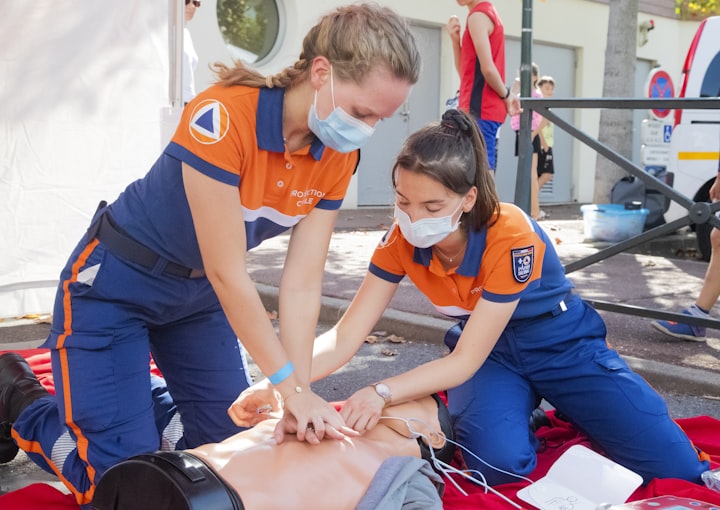How to Recognize a Heart Attack and What to Do If Someone Experienced at Home?
Health| Personal Care |Fitness
There are several common signs and symptoms of a heart attack that you should be aware of. These include:
Chest pain or discomfort: This may feel like a tightness, pressure, or squeezing in your chest. It can range from mild to severe, and may last for a few minutes or come and go.
Pain in other parts of your body: You may feel pain or discomfort in your arms, neck, jaw, back, or stomach during a heart attack.
Shortness of breath: This can occur with or without chest pain.
Other symptoms: You may also experience nausea, vomiting, lightheadedness, or breaking out in a cold sweat.
If you or someone you know is experiencing these symptoms, it is important to call emergency medical services right away. Do not try to drive to the hospital or have someone else drive you. It is important to get medical attention as soon as possible, as a heart attack can be a life-threatening event.
While waiting for emergency medical services to arrive, try to stay calm and comfortable. If you are with the person experiencing the heart attack, stay with them and provide support and reassurance. If you are alone and are able to take medications, such as aspirin or nitroglycerin, do so as directed. Do not try to drive yourself or have someone else drive you to the hospital.
In addition to the signs and symptoms listed above, there are certain risk factors that can increase your likelihood of experiencing a heart attack. These include:
- High blood pressure
- High cholesterol
- Diabetes
- Smoking
- Obesity
- Physical inactivity
- Family history of heart disease
If you have any of these risk factors, it is important to work with your healthcare provider to manage them and reduce your risk of a heart attack. This may involve lifestyle changes, such as eating a healthy diet, getting regular exercise, and quitting smoking, as well as taking medications as prescribed.
It is also important to be aware of your own personal symptoms and seek medical attention if you experience any of the signs of a heart attack. The sooner you receive treatment, the better your chances of a full recovery.
Heart attacks are a leading cause of death and disability worldwide. According to the World Health Organization (WHO), cardiovascular diseases, including heart attacks, are the leading cause of death globally, accounting for 17.9 million deaths per year.
In the United States, heart disease is the leading cause of death for both men and women. According to the Centers for Disease Control and Prevention (CDC), about 735,000 Americans have a heart attack each year, and about 610,000 of these are first-time heart attacks.
It is important to note that heart attacks can be prevented by managing risk factors, such as high blood pressure and cholesterol, and adopting a healthy lifestyle. By making lifestyle changes and seeking medical care when needed, you can greatly reduce your risk of having a heart attack.
There are several steps you can take to reduce your risk of having a heart attack:
Eat a healthy diet: A diet that is rich in fruits, vegetables, whole grains, and lean proteins can help lower your risk of heart disease. Avoid processed and sugary foods, as they can increase your risk.
Get regular exercise: Aim for at least 30 minutes of moderate-intensity aerobic activity, such as brisk walking, every day. Exercise can help lower blood pressure and cholesterol, and improve your overall heart health.
Quit smoking: If you smoke, quitting is one of the best things you can do for your heart health. Smoking damages your blood vessels and increases your risk of heart disease.
Manage stress: Chronic stress can raise blood pressure and weaken your immune system, which can increase your risk of heart disease. Practice stress-reducing activities, such as meditation, yoga, or deep breathing, to help manage stress.
Get enough sleep: Lack of sleep can raise your blood pressure and increase your risk of heart disease. Aim for 7-9 hours of sleep per night.
Get regular medical check-ups: See your healthcare provider regularly to check your blood pressure, cholesterol, and blood sugar levels. This can help identify any potential issues early on, so they can be managed before they become more serious.
By following these steps, you can help reduce your risk of having a heart attack and improve your overall heart health.
What do if Heart attack someone else is experiencing at home:
If you suspect that you or someone else is experiencing a heart attack at home, it is important to call emergency medical services immediately. Do not try to drive yourself or have someone else drive you to the hospital.
While waiting for the ambulance to arrive, stay calm and try to keep the person comfortable. If you are with the person experiencing the heart attack, stay with them and provide support and reassurance. If you are alone, try to stay on the phone with the operator or a friend or family member until help arrives.
If the person is able to take medications, such as aspirin or nitroglycerin, as directed by a healthcare provider, do so. Aspirin can help to thin the blood and improve blood flow to the heart, while nitroglycerin can help to relax the blood vessels and improve blood flow.
It is important to get medical attention as soon as possible if you suspect a heart attack. Time is of the essence in treating a heart attack, as the longer it takes to get treatment, the more damage can be done to the heart muscle. Don't delay seeking medical attention, as a heart attack can be a life-threatening event.






Comments
There are no comments for this story
Be the first to respond and start the conversation.